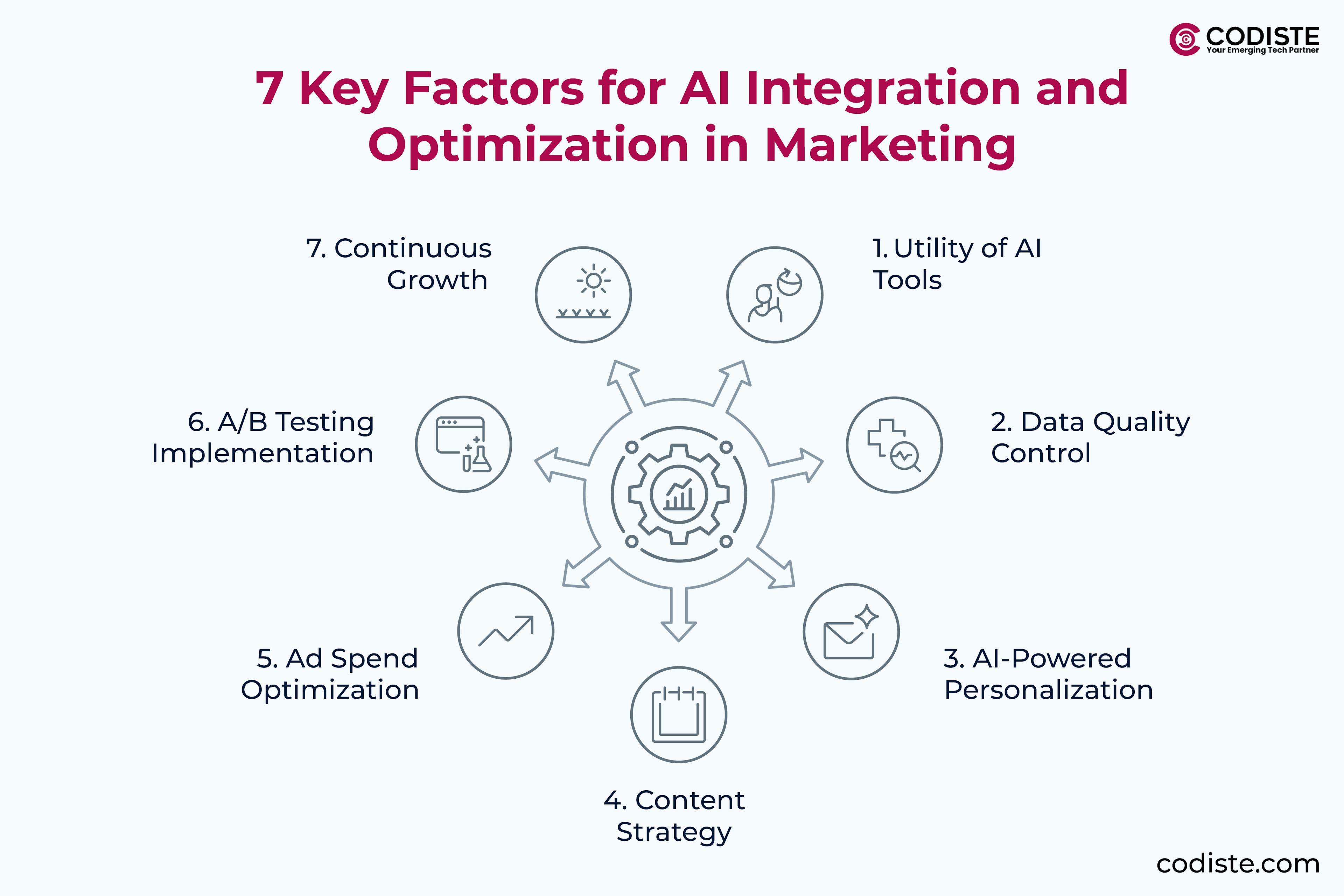
,
The marketing world is evolving at a breakneck pace. You might get left behind if you're not utilizing the full potential and power of your data with AI-driven marketing optimization.
In this guide, we peel back the layers of data-driven marketing optimization workflow to help you conserve resources and boost your ROI — with a dash of AI innovation to spark new growth. Let's get started.
What is AI Marketing Optimization?
A mix of various adjustments done to vitalize marketing system optimization is adjusting your marketing efforts with the data available as a form of prediction. Your data informs the AI marketing tools and tactics you include in your marketing strategy. With this optimisation, you can better reach your business goals.
But let's be honest. We've all heard that data-driven decision-making is the key to success. Yet, despite our best intentions and efforts, too many decisions in the marketing realm are still being made based on gut feelings, educated guesses, and experience. With 88% of marketers believing their organisation needs to increase its use of AI and automation to stay competitive, that won't cut it.
Understanding your marketing systems is essential for an enterprise’s AI marketing optimization. It helps organisations transform decision-making from feeling like a coin flip into a surefire strategy backed by a plan. The study of marketing systems goes beyond understanding past performance — it’s about proactively understanding your audience and making strategic decisions that secure your success.
The Evolution of Marketing Optimization with AI
Creativity and (some) risk-taking have their place in marketing but not in marketing optimization workflow. A survey by Influencer Marketing Hub shows that 19.2% of marketers are putting their trust and over 40% of their budget — into AI-driven campaigns, highlighting the shift toward data-driven decision-making and personalisation.
This is where marketing systems use AI-driven data, statistical algorithms, and machine learning to translate past performance into future events. Evaluating past behaviours and identifying patterns empowers marketers to predict customer actions, discern trends, and make preemptive decisions using AI-powered tools that give them a competitive edge.
Unlocking your marketing efforts requires examining the core elements fueling predictive analytics success. This section will unravel the critical aspects of an optimised marketing process, providing the insights and tools needed to elevate your strategies and ensure their effectiveness and exceptionality.
Key Considerations for AI Integration in Marketing
When integrating AI into your marketing strategies, there are several key considerations to keep in mind to ensure success:
- Data Quality and Integration
AI tools rely heavily on high-quality data to function effectively. Ensuring your data is accurate, complete, and integrated across different systems is crucial. This means regular data audits and implementing robust data management practices. - Scalability
As your marketing efforts grow, your AI tools must be able to handle increasing volumes of data and traffic. Ensure that the AI solutions you choose are scalable and can adapt to the evolving demands of your marketing campaigns. - Ease of Use
Not all marketers have technical expertise, so your AI tools must be user-friendly. Look for solutions offering intuitive interfaces and clear insights and recommendations, making it easy for your marketing team to leverage AI without a steep learning curve. - Transparency and Explainability
AI tools should offer transparency in their decision-making processes. It's essential to understand how AI arrives at its conclusions and recommendations. Choose AI tools that provide explainable results, ensuring your marketing strategies are based on clear and understandable insights.
Considering these factors, you can effectively integrate AI into your marketing strategies, enhancing your marketing efforts and driving sustainable business success.
Get started today and let AI agents drive results in weeks.
The 7 Factors for the AI-integration in Marketing Optimization Process
To optimize AI marketing systems, focus on strategies that enhance personalisation, ad spending, customer journey optimisation, content creation, and A/B testing. Here's a guide to performance tuning:
1. Understanding the Utility of AI Tools for Marketing
The benefits of using AI tools for marketing are numerous and can significantly enhance the efficiency and effectiveness of your marketing efforts. Here are some of the key advantages:
- Improved Efficiency
AI tools can automate repetitive tasks, such as data entry, email marketing, and social media posting. This automation frees your marketing team to focus on more strategic and creative work, ultimately boosting productivity and innovation. - Enhanced Personalization
AI tools can deliver highly personalized experiences by analysing customer data and behaviour. Whether tailoring content, recommending products, or targeting ads, AI ensures that your marketing messages resonate with individual customers, increasing engagement and conversion rates. - Predictive Analytics
AI tools analyse historical data and market trends to predict future customer behaviour. This predictive capability allows you to optimize your marketing strategies, ensuring you are always one step ahead of your competitors. - Increased ROI
AI tools can optimize ad spending and improve the relevance of marketing messages, leading to higher conversion rates and increased customer lifetime value. This means you get more bang for your buck and maximize your return on investment. - Better Customer Insights
AI tools can uncover valuable insights through vast customer data. These insights inform your marketing strategies, helping you better understand customer behaviour and preferences, which improves customer engagement and loyalty.
2. Asses Data Quality and Management
Effective data quality and management are crucial for organizations to ensure their data is accurate, reliable, and useful for decision-making. Here are key components to consider:
- Audit Data Sources
Identifying all data collection points is essential for assessing the quality and relevance of the data provided. This process helps organizations pinpoint potential issues and ensures data sources align with business objectives. - Accurate Data Collection
Implementing robust tracking systems across digital properties ensures data is collected consistently. Establishing uniform naming conventions and tagging across campaigns and channels enhances data integrity and facilitates easier analysis. - Data Aggregation and Cleaning
Combining data from multiple sources into a central repository is vital for comprehensive analysis. This step involves removing duplicates, correcting errors, and normalizing data formats to maintain consistency and improve overall data quality.
3. Use AI-Driven Personalization with AI Marketing Tools
AI-driven personalization leverages advanced technologies to enhance user experiences by tailoring content and interactions based on individual preferences and behaviours. This approach significantly improves engagement and conversion rates.
- Data Analysis
Use AI to analyse data from various sources, such as social media, website visits, and email interactions, to create personalised experiences based on customer behaviours. - Content Personalization
Tailor content, target advertising, and personalised product recommendations to increase engagement and improve customer interactions. - Predict Customer Needs
Use AI to analyse previous interactions, purchases, and browsing behaviour to predict customers' wants or needs.

4. Planning & Optimizing Content Strategy
Content optimization is essential for enhancing the effectiveness of digital marketing strategies. Conduct effective keyword research using an AI tool to ensure content ranks higher in search engines by identifying trending topics and optimizing for relevant keywords. By utilizing AI technologies, businesses can refine their content to meet audience needs better and improve engagement.
- AI-Driven Analysis
Use AI algorithms to analyse data, providing insights into audience preferences and behaviour to enhance content relevance and engagement. - Keyword Research
Conduct effective keyword research to ensure content ranks higher in search engines by identifying trending topics and optimising for relevant keywords.
5. Ad Spending Optimization
Ad spending optimization involves leveraging advanced technologies to ensure marketing budgets are allocated effectively across various channels. This strategic approach maximizes return on investment (ROI) and enhances overall marketing performance.
- AI Algorithms
Use AI algorithms to predict the most effective allocation of ad budgets across different channels and times. - Marketing Mix Modeling (MMM)
Use AI to understand the impact of different marketing channels on overall performance and optimise the channel mix for maximum effect. - Real-Time Budget Allocation
AI algorithms can reallocate budgets in real-time based on performance data, ensuring investment in the most effective channels.
6. Optimize and Implement A/B Testing
A/B testing and optimization are vital for improving marketing effectiveness by systematically comparing different campaign elements. Leveraging automation and AI enhances testing, leading to data-driven decisions and improved outcomes.
- Automated A/B Tests
Set up automated A/B tests to continuously test different elements of campaigns, from email subject lines to ad creatives. - Real-Time Performance Monitoring
Leverage AI-powered dashboards to track KPIs and spot trends as they emerge. - Dynamic Ad Variations
Automatically generate and test multiple ad copies and formats to identify the best-performing combinations.
7. Focus on Continuous Improvement
Continuous improvement is a crucial aspect of modern marketing strategies. It enables businesses to evolve and adapt based on insights gained from past campaigns. By leveraging AI technologies, organizations can create a dynamic system that fosters ongoing enhancement and responsiveness to market changes.
- Learning Loop
Use insights from each campaign to inform and improve future efforts, creating a continuously improving marketing system. - Adapt to Market Trends
Use AI's predictive capabilities to anticipate shifts in customer behaviour or market conditions, allowing you to adjust your strategy proactively.
Reaping the power of AI to optimize these key areas, marketers can uncover valuable patterns within customer data and implement data-driven improvements. This approach enhances decision-making and evolves a deeper understanding of customer preferences and behaviours. Ultimately, leveraging AI enables businesses to create more personalized and effective marketing strategies, driving growth and ensuring long-term success in an ever-evolving marketplace.
Why is AI Marketing Optimization Essential to Your Marketing Strategies?
Marketing optimization workflow are often misunderstood and unfairly criticised. Some may argue that this can lead to excessive spending, but that's not an inherent part of optimisation; instead, it would reflect poor implementation, especially in areas like social media marketing.
When done correctly, marketing optimization can save money by identifying and targeting the most effective strategies. It's a powerful way that allows businesses to make data-driven decisions and maximise their return on investment. Dismissing AI marketing optimization as overrated without considering its potential benefits is short-sighted.
Don't we need to strive and make customers happy and see the same results?
To be sure, it's important to prioritise customer satisfaction and loyalty. But that's not necessarily a better business strategy than focusing on marketing optimization. After all, these are interconnected ideas and activities! When executed effectively, marketing optimization can enhance customer satisfaction and loyalty by targeting the right audience, communicating the product or service's value, and creating a positive brand image.
Moreover, it's essential to balance both approaches, as neglecting this may limit a company's reach and growth potential, while ignoring customer experiences may result in high churn rates and negative word-of-mouth. A holistic approach integrating AI-based marketing optimization and customer-centric strategies is best for driving sustainable business success.
Conclusion
Marketing automation efficiency is making data-driven adjustments to your marketing efforts to reach your business goals better. Marketing system optimization is essential to maximising return on investment and should not be dismissed as overrated, especially with AI marketing tools. Balancing marketing automation efficiency with customer-centric strategies is crucial for sustainable business success.
Now comes the question: How to improve AI marketing system performance? Or something like how enterprises can be tuning AI models for marketing automation? You need not worry about these things, as we have covered you. By incorporating marketing strategies into your business processes, you're not just keeping up — you're setting the pace for an AI-driven future. To be part of this journey, you can venture with us at Codiste, as we have everything it takes to take you to the next level. Connect with us now.



What is Agentic AI? A Beginner's Guide to the Future of Software Development
Know more
AI in Customer Service: Trends & Predictions for 2025
Know more
A Deep Dive into How Agentic RAG Automates Data Retrieval and Analysis
Know more
